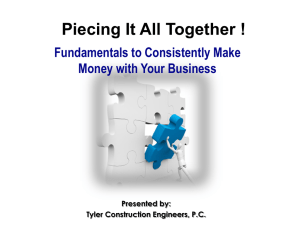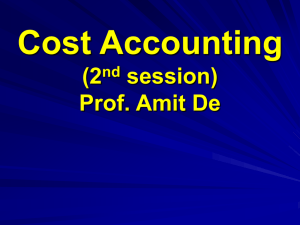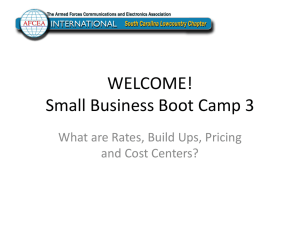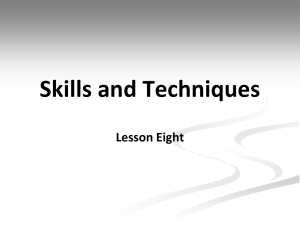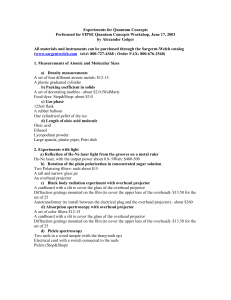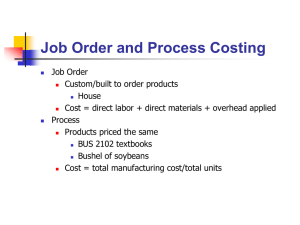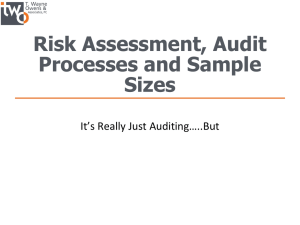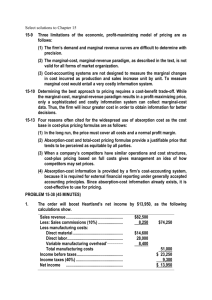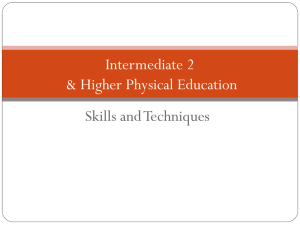Bid Estimating Strategies
advertisement
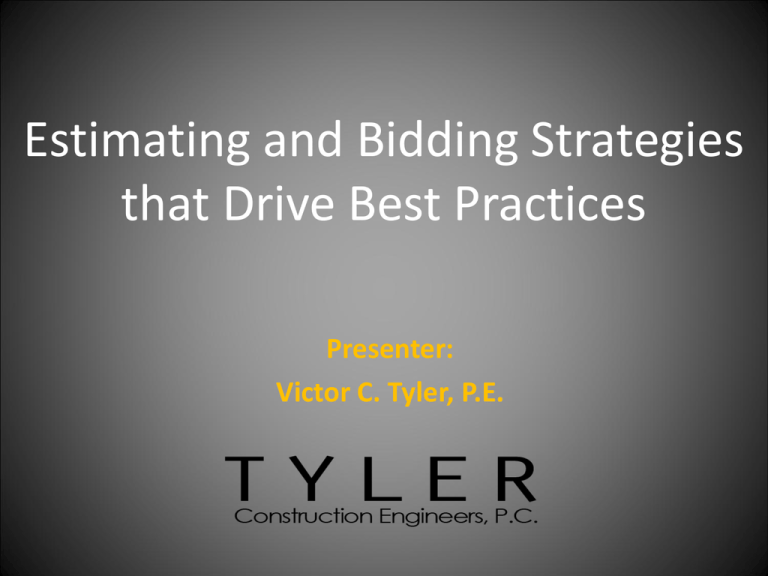
Estimating and Bidding Strategies that Drive Best Practices Presenter: Victor C. Tyler, P.E. Victor C. Tyler, P.E. • President/ owner of Tyler Construction Engineers, P.C. • Licensed Professional Engineer in state of Tennessee • Author “How To Estimate Road Construction Accurately” • Cost and Pricing Specialist • Management consultant to the engineering & construction industry How Time In Construction is Spent Opportunities for improvement 36% other activities 64% Installation Planning makes actual installation more efficient Other activities such as site movement, material logistics, general nonproductive time and rework is minimized The Average Construction Day DESCRIPTION % HOURS/DAY Study Plans Material Procurement 3% 3% 0.24 0.24 Receiving & Storage Mobilization 3% 5% 0.24 0.40 Site Movement Layout & Marking 5% 8% 0.40 0.64 Actual Installation Cleanup 64% 3% 5.12 0.24 Breaks – Non-Productive 6% 100% 0.48 8.00 TOTAL DAY Where can we improve? Look at 176 Man-hour Month DESCRIPTION % HOURS/ MONTH Study Plans 3% 5.28 Material Procurement 3% 5.28 Receiving & Storage 3% 5.28 Mobilization 5% 8.80 Site Movement 5% 8.80 Layout & Marking 8% 14.08 Actual Installation 64% 112.64 Cleanup 3% 5.28 Breaks – NonProductive 6% 10.56 TOTAL MONTH 100% 176.00 For one employee approximately 63 hours per month is spent on activities other than actual installation …. approximately 760 hours per year for that one employee. $45,619 per year If you have 4 full-time field employees paid at $15 per hour … That’s why I talk about productivity in the estimating processes for both field employees and equipment. Today’s Tip Use accurate rates and reduce idle time. Lunch ______ Breaks Only _____ are 100% Productive! Estimating Accurate Job Costs Bidding on Profitable Jobs Making Profits on Every Job Won 8 The job of every estimator is to help his or her firm acquire profitable work. Thus the top priority for the estimator is to estimating accurate job costs. Strategy Tyler’s Cost Strategy 101 1. Organized and document data 2. Be detailed and factual 3. Base the estimate on historical data 4. Use a predictable, measurable and repeatable processes (use checklists, templates, software) 5. Always monitor your progress and make adjustments as required Tyler’s Cost Strategy 101 6. Know and understand your costs (Labor + Material + Equip + Subs + Job Site Overhead) 7. Make the estimate comparable to the P&L Statement (Revenue – Job Cost – Overhead = Profit) 8. Cost first,…then price (Price = Direct Costs + Overhead + Profit) Know Your … Direct Job Cost • Material • Labor • Equipment • Subcontractors • Other direct cost Know Your … Job Site Overhead Costs (General Conditions) Labor Burden Indirect Labor Job Supervision Tools & Consumables Insurances Travel Other Cost First, then Price Strategy . Accounting is BORING! Bid Price Structure Contract Price Total Cost Direct Cost Work Item Cost Profit Gen & Admin. Profit Jobsite OH Markup Mat l. Labor Equip Subs Jobsite OH Markup Estimate Summary Company Income Statement The Estimator’s View The Accountant’s View Direct Costs …………………….. $$$ Direct Labor Equipment Materials Subcontractors General Conditions plus Labor Burden (%) plus Job Site Overhead (%) equals Total Direct Cost ……….. $$$ Contract Revenues …………………… $$$ minus Direct Cost of Sales Direct Labor Equipment Materials Subcontractors Other Direct Costs minus Indirect Costs .……………… $$$ Labor Burden Benefits Indirect Expense plus General & Administrative (%) plus Profit Rate (%) equals Gross Profit ………………… $$$ plus Bond Rate (%) minus General & Administrative Expenses equals Total Contract Price ……… $$$ equals Income (Loss) Before Taxes …… $$$ Understanding Risk & Pricing Project A Project B Project C Labor Material Equipment Subcontractor Other $10,000 $20,000 $5,000 $169,000 $2,000 $50,000 $70,000 $7,000 $76,000 $3,000 $90,000 $90,000 $20,000 $2,000 $4,000 Total $206,000 $206,000 $206,000 Overhead – 10% $20,600 $20,600 $20,600 Profit – 12% $24,720 $24,720 $24.720 $251,320 $251,320 $251,320 Total bid Example from Book, “Managing a Construction Firm on just 24 hours a day”, by Matt Stevens Understanding Risk & Pricing Project A Project B Project C Labor Material Equipment Subcontractor Other $10,000 $20,000 $5,000 $169,000 $2,000 $50,000 $70,000 $7,000 $76,000 $3,000 $90,000 $90,000 $20,000 $2,000 $4,000 Total $206,000 $206,000 $206,000 Labor/Equipment – 15% Material/Subs/other –5% Office Overhead – 10% $4,500 $9,550 $20,600 $8,550 $7,450 $20,600 $16,500 $4,800 $20,600 Profit – 5% $12,033 $12,130 $12,395 $252,683 $254,730 $260,295 Dual Overhead Allocation Total bid Example from Book, “Managing a Construction Firm on just 24 hours a day”, by Matt Stevens Margin vs. Markup Job Profit and Loss Statement Sales ……………. $ Less COGS …... Gross Profit ……. Less OH ………..… Net Profit ..…….. 700,000 507,000 193,000 175,000 18,000 As a % of Sales Markup As a % of Direct Cost 100 % 138 % 72 % 100 % 28 % 38 % 25 % 34.5 % 2.6 % 3.6 % Basic Cost Summary Expanded Cost Summary % of Revenue % of Direct Costs $ 700,000 136.72 % Labor 120,000 23.44 Material 300,000 58.59 10.71 Equipment 75,000 14.64 1.71 Subs 12,000 2.34 Other Cost 5,000 0.98 Total Direct $ 512,000 100.00 Labor Burden $ 40,000 7.81 Supervision 75,000 14.65 Total Job Site $ 115,000 22.46 $ 627,000 122.46 Gross Profit 73,000 14.26 Overhead 55,000 10.74 $ 18,000 3.52 $ 700,000 100.00 Labor 120,000 17.14 Material 300,000 42.86 Equipment 75,000 Subs 12,000 Revenue Overhead and Profit 193,000 Revenue Direct Costs 27.58 Job Site OH Total Cost Input Profit Quick Study Example: Cost Multipliers You are preparing a bid for Project XYZ and have estimated the direct costs as follows: Direct Costs Labor - $ 75,000 Material - $150,000 Equipment - $ 75,000 Subcontractors - $ 50,000 Create an estimate summary utilizing the cost multipliers we calculated. Therefore, the estimate summary becomes: Direct Cost (labor, material, equipment, subcontractors) Labor Burden: $ 75,000 x (25.93 % ) Job Overhead: $ 350,000 x (14.53 %) Office Overhead: $ 420,302.50 x (7.81 %) Total Project Cost (without Profit) = $ 350,000.00 = 19,447.50 = 50,855.00 $ 420,302.50 = 32,825.63 = $ 453,128.12 • Position (Market) • Project Strategy to winning • People more profitable work. • Product / Service • Price • Production • Profit Best Practices … • Know Your Cost (Estimating) • Understand Your Cost (Project Management) • Control Your Cost (Project Accounting) • Continuous Improvement (Always) on each & every job More Predictable QUESTIONS? Thank You! 810 Dominican Drive, 3rd Floor Nashville, TN 37228 dbe_supportive_services@tyler-engineers.com www.tyler-engineers.com 1.888.385.9022 615.469.5398
